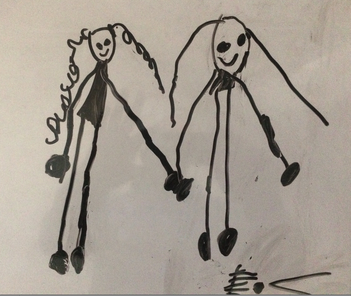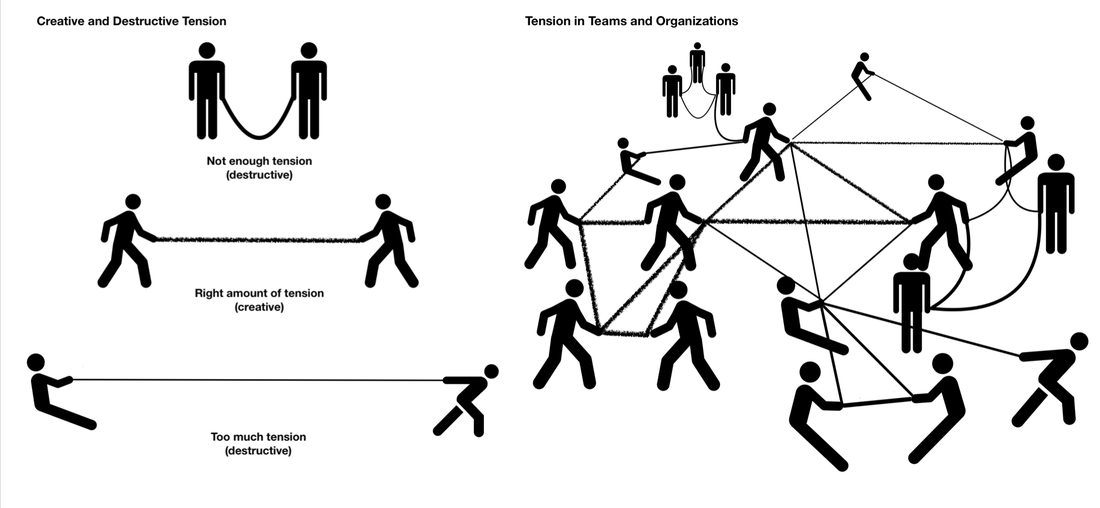|
I have written before in my blogs and books about the idea of creative tension and how it can help us understand and diagnose the challenges and opportunities embedded in our relationships and work.
At the end of this week, I am stepping away from a team with whom I have worked for many years and with whom I have sustained a consistent, productive, and genuine creative tension. From a startup trying to take a mobile communication product into high schools to a pivot into healthcare, an acquisition by a healthcare company, and finally to an acquisition of that company by an even bigger healthcare company, we have worked and grown and learned and iterated together for the better part of six years. We all brought different skills and perspectives. Our ages varied. Our backgrounds varied. Our approaches to creativity and problem solving varied. Ultimately, however, we aligned around a set of principles that I now discuss as the elements of creative tension, but identified and learned largely through our work together. We didn’t know them and then practice them. We practiced them and came to know them. Shared Purpose: There is a common goal that necessitates working together to accomplish. Ownership: The collective owns the goal and understands various roles, responsibilities, skills, perspectives, and relationships needed to achieve the goal. Commitment: All parties commit not only to the process of working together but to their individual roles and responsibilities in the work. Teaching/Learning: Everyone is a teacher. Everyone is a learner. Collective Action: The act of working together creates tension that informs the evolving purpose and nature of the work as a whole. Reflection: The collective remains vigilant and reflective, as individuals and as a group, so that the tension remains creative and not destructive. Creative tension is a constantly changing dynamic of a relationship – a relationship between people and the work they are trying to accomplish together. For a visual, take a look at the images above and imagine yourself holding one end of the rubber band(s) with your colleague(s) holding the other. Sometimes, we are pulling the band(s) too tight. We introduce too much tension, reduce the flexibility of the rubber band, and introduce a fear that someone may drop their end and pop us with it, or even pull harder until it breaks. This is destructive tension caused by too much tension. Other times, we aren’t pulling much at all. The band is limp, without energy or possibility. This is destructive tension caused by an absence of tension. Creative tension is all about finding that right degree of tautness in the band where there is energy, and sound, and possibility, and the people holding it are relating positively and actively to each other and the band itself. The right amount creative tension is always changing, just as we and our work and our lives outside of work are always changing. As people change and as work changes, maintaining this creative tension requires constant vigilance – and as I have learned recently, simply may not always be maintainable. As I move on to a new startup, I feel the sincere loss of the creative tension of my team – although I look forward to helping build it with a new one. But, as our work and the organizations in which it has happened have evolved over the years, I found myself no longer able to generate the sense of purpose, ownership, and teaching/learning I needed to hold up my end of the rubber band, maintain my part of the creative tension. For me then, I feel a responsibility to move on. I genuinely believe that this is the creative act even as it comes with a significant sense of loss.
0 Comments
 Over my 6 years of being a parent, particularly the last few, I have stumbled several times upon otherwise mundane words and phrases that when I say them to my kids suddenly feel newly important. They are never planned, but as they come out of my mouth they do so with a fullness that I immediately recognize and attach to. The first phrase I remember finding re-remarkable as a parent was: thank you. I certainly had said thank you to my kids when they were babies and offered me a handful of their smashed bananas or their slobbery stuffed animal or something like that. This wasn’t the thank you that gave me pause. It was when they were old enough to start to take on tasks, either by request or their own motivation. It was that first time I dropped something and they picked it up for me. Or, the first time her sister needed help and she scurried over to provide it. Or maybe, that first time I asked them to go get something for me in another room and they happily did so – proud to be able to help. Regardless of the specifics, when I said this kind of thank you to my girls for the first time, it felt like a sincere validation of their contribution – their proactive and meaningful presence making purposeful contact with me, with the world. It overtly acknowledged their power to help other people – hopefully reinforced by some sense of what that means, or at least how it feels to do so. Because of this, I have found myself more mindful of sharing my gratitude with my kids not merely as a tool to reinforce the behaviors I want or expect but as a way of telling them they have the power to create meaning with others. I don’t know: maybe I’m just a tired, somewhat defeated, overly emotional parent looking for “a win”, but that feels like something profound to me. Sometime, maybe a year or more, after thank you took on new meaning, another mundane phrase also resurfaced with a sense of newness: I’m sorry. I am certain I had said I’m sorry to my daughters previously for accidentally bumping them in the head with an errant elbow, tripping over them as they crept up behind me in the kitchen, or doing something in the wrong way. But, the I’m sorry that was so meaningful was related to my being wrong about or mishandling something. I’m sorry I raised my voice. I should have handled that better. I’m sorry I got after you without really understanding what happened. I should have listened to understand the situation better. I’m sorry I forgot about or minimized that thing that was so important to you. In these cases, I wasn’t sorry because of an accident; I was sorry because I was wrong. And, those are profoundly different in nature. I want my children to know I am human and I am flawed and I am willing to admit it, because I want them to grow up and be the same way. I don’t want my children to look up to me and respect me because they think I have all the answers. I want them to do so because they know I don’t and they know I know I don’t. In other words, I want our relationship to be based on truth and for that to be a prism through which they seek to know and impact the world around them. Along the lines of truth-seeking, I have most recently found myself thrilled by the random, inane, brilliant, innocent, and humbling conversations I am beginning to have with my kids. In these, I have heard myself repeatedly saying: that’s a great question. Again, this isn’t much of a mind-blower under normal circumstances (it’s often just a way to buy time to concoct an answer), but as I heard myself start saying it to my daughters, it felt like the most important thing I could ever say to them. You have questions. Questions are important. You should ask them. You should seek answers. Please, always ask questions! Beyond the gratitude and power and humility of the thank yous and I’m sorrys, I don’t know what I could wish to instill more in my children than an insatiable curiosity and confident exploration of their lives, relationships, and anything and everything else that makes them wonder. I’ve written previously about two of these questions: 1. What is freedom? and 2. What is peace? I obviously don’t have all the answers, but I think validating the question is more important anyway. I am sure there will be more words and phrases that take on new meaning as my children and my parenting continue to grow up. What word or phrase will be next? Well, we will obviously have to wait and see. But, I think it’s a good question. |
Categories
All
Archives
April 2024
|

 RSS Feed
RSS Feed